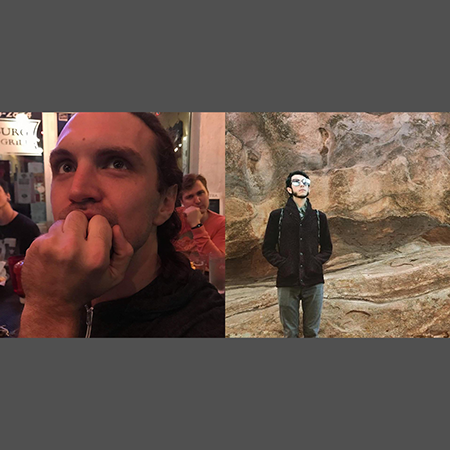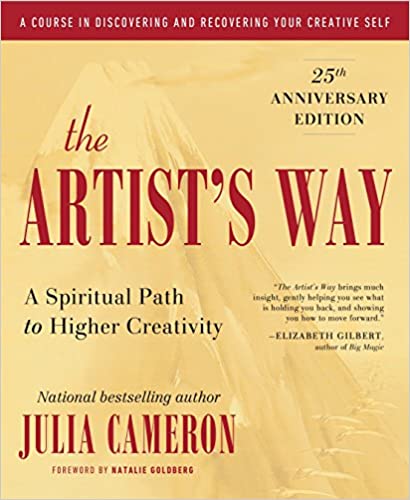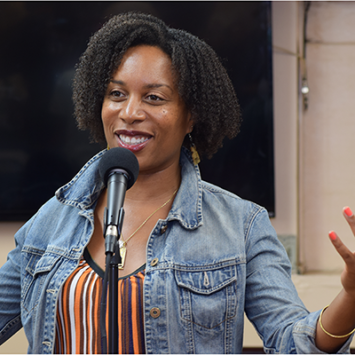The Psychology of Improv
- My Niche Is Human
- Episode 11
- 42 minutes
- Interview
- Autonomy, Cognitive, Identity, Self Actualization
Show Notes
- How (performing) Improv can lead to a better life
- Ways to practice the tools Improv provides even in the comfort of your own home
- A special, one-of-a-kind segment at the end of the episode you won’t want to miss

A conversation with Amadeus Dameron and Zach Mouriz
Learn how to practice free association to exercise and stretch your brain and release your ego. Improv is a special kind of medicine, one that can lead to a more courageous life. This episode is an interview with two Improv performers; Zach Mouriz and Amadeus Dameron. They were gracious with their time to come on the show and share some of the inner workings of the magic of Improv.
This podcast among many other projects I’ve personally pursued in my life were all attempts to find a way of living outside of my head. I was a prisoner in my own body and mind for a long time. I found Improv to break out of my internal world and found an amazing art form in the end.
Resources Mentioned
Many of our behaviors are driven by our desire to achieve a particular status relative to those around us. People continually raise and lower their status in conversation through body language and words. Say yes to more and stop blocking the opportunities that come your way.
- Impro: Improvisation and the Theatre by Keith Johnstone
- Jason Silva, Shots of Awe, and referenced expert of FLOW
- Default Mode Network
- Avatar: The Last Airbender
- Avatar the movie
The Psychology of Improv – Zach and Amadeus
Steven: [00:00:00] This is episode number 11 of the, my niche is human podcasts.
Back to another episode. Thank you for joining today. We’re going to be interviewing two of my friends from an improv theater that I discovered down here in St. Pete Florida. Zach and Amadeus. This episode, I’m enormously proud of these two gentlemen have great courage as they perform weekly. Today, we’re going to talk about how they unpack the psychology and learning lessons that they’ve gotten through practicing improv and how you can learn those too.
So stick around till the end, because we got a little surprise for you.
***
You’re waiting for us to start,we’ve already started because something that I learned from Gary V was. Again, psychology. You don’t just say “go!”
Zach Mouriz: [00:00:49] Yes!
Steven: [00:00:49] Because the reaction is, ah!, fuck. Right. So we’re just gonna, we’re going to keep talking and before you know it, you’re going to get your tetanus shot, the bandaid is going to come off and we’re off and running.
Zach Mouriz: [00:00:59] Yeah. Interesting. Yeah. I’ve always felt that way. Like when I tell people that I do improv, oftentimes they don’t know what improv is and they just think stand-up comedy. And so then it’s “Oh, tell me a joke.” Right? And it’s that same thing, “go”. And the last thing you want to do, when you tell people that you’re funny is get put on the spot and be told to perform, right.
Steven: [00:01:19] “Make me a bike, clown.”
Zach Mouriz: [00:01:20] Yeah. Right here we go, get to it.
Amadeus Dameron: [00:01:22] Or like you’ll have people messaging and be like, yo, this is a really funny joke, maybe you can add it to your next standup. It’s like, dude, I don’t do stand up. Yeah.
Steven: [00:01:32] So what would you say is the starkest difference between standup and improv?
Zach Mouriz: [00:01:37] Yeah. It’s all made up on the spot.
Amadeus Dameron: [00:01:38] Yeah.
Zach Mouriz: [00:01:38] That’s it. Right. And it should be done with more than one person,
Steven: [00:01:42] Which one?
Zach Mouriz: [00:01:44] Improv. Standup is necessarily individualistic, right? In a way, you spend a lot of time working with people, I think. Right. riffing off of those ideas, but ultimately it comes down to you improv it’s the exact opposite.
Steven: [00:01:57] Do any comedians stand up there and improv?
Amadeus Dameron: [00:02:01] Actually, yeah, some of them who were really good adept at their craft, they might do like a set. I think it’s called “set without a net”. And then they might like get a, just a host of random topics appearing on the screen and then they have to riff in front of an audience.
So that’s really impressive. That’s, that’s intimidating. But also, you know, as a comedian, you’re drilling the same stuff and you’re like, carving and making this sculpture with these words and trying to like cast a spell on the audience. And in improv there’s none of that, it’s you do something, it might be magical and phenomenal, or might be really fricken weak, and then you just gotta toss it into the ocean, whether it’s beautiful or not.
Zach Mouriz: [00:02:36] Yeah, yeah. That my favorite, sort of saying about improv, that I got from a mentor of mine is; improv is just a bunch of people falling down the stairs, just everybody’s just flailing and floundering. And then at the very end, somehow the last step, everyone lands on their feet. Right. And that’s something you can’t get in standup comedy.
Right. I think that’s the fundamental differences. Stand up. Maybe there’s the fear, just like the butterflies you get when you’re about to give a public speech, but there’s no fear of like, “Wow. I hope it goes well tonight. I have no idea what’s about to happen”, you know?
Steven: [00:03:08] No control?
Zach Mouriz: [00:03:09] Yeah.
Steven: [00:03:10] Form of surrender, right?
Amadeus Dameron: [00:03:11] There’s no “tight five” in Improv, you can try all you want
Zach Mouriz: [00:03:16] Been trying for almost a decade. Yeah.
Steven: [00:03:19] Excellent. Well, thank you two for coming over, I’m sitting with two of my friends, Zach Morris and Amadeus.
Amadeus Dameron: [00:03:26] Damneron.
Zach Mouriz: [00:03:26] Dameron.
Steven: [00:03:27] Thank you. We’re good friends. I just
Amadeus Dameron: [00:03:29] yeah. Was on his last name like you too, Stefan. Thank you.
Steven: [00:03:34] Touche, Excellent.
So we’re here to talk about improv theater, comedy, some of the dark sides and the light sides and how psychology intertwines everything in between, because our niche is human.
Zach Mouriz: [00:03:47] Yes, indeed.
Steven: [00:03:48] So, This question is for each one of you individually. Why and how did you get into improv? And do you remember the first moment it kind of occurred to you?
Amadeus Dameron: [00:03:57] Yeah, I think you should take that one first, Zach.
Zach Mouriz: [00:04:00] Sure. Yeah. That’s I’ve got a, such a long journey with improv, but it started, sort of serendipitously. I, I wanted to go to UF so badly. I just, I was like ready to be a Gator and my test scores just didn’t, didn’t cut it. You know, I, and so I applied to a couple other places and it ended up being USF because of their Quidditch team, that I did Quidditchl for years with USF too.
But, it was the first week, the week of welcome at USF, which is, you know, just all the freshmen. You know, you have a week before classes start, you can just kind of figure out what all the clubs are and, what’s going on campus. And I had made a friend, during the week of welcome and, I saw that there was going to be an improv show. And I loved comedy.
I would come home after school every day and watch, you know, like stand up and stuff like that. So I said, let’s fucking go do it, man. Let’s go. And it was the improv club on campus that had been created like the semester before.
And there were six people in it. And at the end, they said, if you want to sign up, we have sign-ups in the back. And I grabbed my friend’s hand and I dragged him. I said, Ricky, we’re going to, we’re going to do this. I’ve noticed with improv, especially, people j”ust know”. They say to themselves like, Oh, this is entirely for me.
I’ve been improvising my whole life. So I, yeah, I signed up immediately. they had a meeting the next week in the black box theater, communication building, third floor. And, yeah, I remember the very first time, I knew it was for me. We were doing this like freeze and justify game, which in retrospect, the worst improv warmup ever. Don’t all it does this teacher incredibly bad habits. right.
But yeah, we’re doing freeze and justify and somebody was like down on their knees being a cactus and I froze the scene and I tagged them out and I, I sang the, we are the Lollipop Guild thing from Wizard of Oz and everybody laughed.
And I was like, I’d never experienced that feeling before. And from there on out, that was it.
Steven: [00:05:49] Let’s zoom in and unpack that. What was that feeling?
Zach Mouriz: [00:05:52] Yeah, it was, so I, I have a, sort of a pessimistic view of the world that’s hard to, hard to escape from. Always kind of suffered from nihilism and especially existentialism.
So, I was painted a really emo sort of negative, version of myself, always, always. So for the first time I had created something that people appreciated. in the moment, right? I was purely being myself. There was nothing else I could be because the decision happened so quickly. and I was accepted and appreciated for that.
And it just, everything kind of washed away, you know, ultimately what improv does for me is it allows me to, to be myself unapologetically, you know, and without fail.
Steven: [00:06:37] That’s the end of the episode. That’s great.
Zach Mouriz: [00:06:38] That’s nice. I’ll see you later.
Amadeus Dameron: [00:06:40] Right. Bye. All right, so now is it
Steven: [00:06:44] Yes.
Amadeus Dameron: [00:06:44] To tell my story?
So I had no intentions of being a Gator, but I had actually taken an improv class at, a place called American stage, locally. And I wasn’t really feeling it. It just wasn’t, it didn’t seem to be for me. I kind of, I did make one friend there. Her name is Mary. And, even though I just decided it wasn’t for me, she hit me up one night to say, Hey, there’s this improv free-styling thing that I am going to force you to come to.
And I was like, no, I’m definitely not doing that. And then she’s very loud. And, so she dragged me out of the house and told me to come there and who was leading it? But old Zachary here.
Zach Mouriz: [00:07:27] Yeah, the cipher, the cipher. Yeah.
Amadeus Dameron: [00:07:29] And in that we played a bunch of silly improv games and it was a fairly large community of a bunch of misfits and, and odd jobs who were all, weren’t flashy, they weren’t trying to be successful. They were just being themselves through and through and it wasn’t terrifically skilled or anything. They were just being normal people who were doing something that was pretty hard. And I don’t remember what I said, but I said this one line that also got a really strong reaction.
I think it had something to, when something along the lines of, I will throw you out the window, I’m going to black out…. And then, this one girl just screamed her head off when she heard it. And I was like, Oh, okay. This is actually, these people are really cool. And they don’t find my dark horrifying offensive sense of humor, you know, all that off putting.
So I kept coming back. I hung out with the owner a couple of times, he convinced me to take a class. So I go to class and who’s leading it but ol’ Zachary and listening knows, Zach was my teacher for a while. And, we’re on teams together now, but he’s one of the best improvisers I’ve ever seen, ever.
And he’s really phenomenal at what he does. So I started taking classes and they put me in some kind of rhyming improv show, as soon as I got there, which was terrifying. And I, I always had this incredibly rigid box-like perception of myself and I couldn’t ever deviate from it. And it was really making me suffer in all aspects of my life.
And then I started doing improv and it started to chip off a little bit. I found this community of people who applauded me more and more, the more I just kind of exposed myself, in a PC way. And
Steven: [00:09:21] So it’s almost like you can’t fuck up? Like you can’t say that wrong thing and no one’s going to be your friend.
You know, everyone’s so afraid of doing the wrong thing or saying the wrong thing and you’ll lose friends or you’ll be ostracized. It sounds like it’s the opposite. The truer, you were, the weirder..
Amadeus Dameron: [00:09:35] Yeah. You weren’t..
Steven: [00:09:36] The more they would embrace you,
Amadeus Dameron: [00:09:38] You take off the mask. That’s what improvisors learn is to take off the mask that we wear all day long.
Yeah.
Zach Mouriz: [00:09:44] That’s the mantra. Right. In Improv is to say “Yes And”. That failure is a gift and a door to, more opportunities and more comedy. And we have people come to us all the time from, you know, a business point of view, like a professional point of view and say, this really helped me find my own voice, like in my professional life as well, you know. Because yeah, like exactly like what you’re saying, people go into business and they’re so scared to be themselves to make a single mistake.
Oh my money’s on the line.. My, you know, my character is on the line. And luckily, because improv is so absolutely and utterly ridiculous, you know, you’re being like a mouse with a sword in a church. You can, you can kind of let go of that fear a little bit, learn how be yourself in a safer space where everyone is sort of invites you to say” yes, and”, and to laugh at your failures. Then you can take that, pack it up and go wherever you want to go on with your life.
Amadeus Dameron: [00:10:41] Yeah.
Steven: [00:10:41] Yeah. I love it two great answers. Thank you. So that, I sense two themes within that. One is kind of, I heard you both say something about self-acceptance, which leads to self-actualization. So there’s kind of a journey of self, and then you both mentioned, “I said a line and someone laughed.” So there’s power in being able to effect, affect
Zach Mouriz: [00:11:04] yes,
Steven: [00:11:04] The world around us, people around us, especially in a positive way.
So there’s internal and then external. How does that play out through the different realms of comedy theater and so on. Zach, you and I had talked about the dark side of stand-up comedy and how I’ve seen it as it’s like their public therapy. You know, there’s a lot of stories about their parents or damaged relationships and so on, but they make it funny.
Cause everyone in the audience is feeling that pain, but they flip it. So before I go down that; two themes, have you guys thought about that? Does it, does one drive you over the other.
Zach Mouriz: [00:11:37] Yeah, it’s again, for me, it’s definitely the internal that drives it a lot more. Cause, externally, you know, sort of, sort of effecting the world.
You can do that in a lot of ways. I’ve noticed that there are very few avenues to, self-actualization right. It’s although it comes in many different flavors and forms. Foundationally, they kind of present themselves in the same way as time and time again. And it’s gotta be, acceptance and internal conversation and reflection, right? No matter where that comes from.
And with improv, it really, it doesn’t even shed light on the fact that you need to have those internal conversations and reflections. It rips it open entirely because I see, especially cause I’ve, I’ve taught improv for so long.
What I see all the time from people who come to level one that have never done improv before, they’re standing on the sideline, waiting for their turn to come in. And they’re twisted into a knot. They’re holding themselves, like hugging themselves. Their legs are all twisted up, right?
Or people come into scenes, you see that, we see that sort of new improvisers all the time. They hide behind chairs. When the energy starts to expand, they yell the word mom, or they yell the word help or, they’ll always come into an improv scene and say like, “Oh, sorry, this is my very first day working at target.”
Right. And
Steven: [00:12:52] So “sorry” is the keyword?
Zach Mouriz: [00:12:53] Yes. Yes. I’m sorry. I, oops. I’m being myself and I’m doing it the wrong way because I’m in my head and, and I feel like an idiot. Right. And it’s so funny to see that, because we all do it. I did it too when I first started performing. And it’s because when you get up, you can be nothing but yourself, right?
Yeah. Like, like Amadeus said, it rips off that mask. You can’t, you’re not performing zach as a business professional. You’re not performing Zack at a, like an after theater party where you’re hanging out with everybody; you’re just on stage and that’s it, you know, the, the emperor has no clothes.
Steven: [00:13:26] And why is that? Is it fair to say if you don’t let go, you’ll ultimately fail.
Zach Mouriz: [00:13:30] Yeah if you, if you’re thinking about doing improv, you’re doing it incorrectly, it should be acting and feeling.
Amadeus Dameron: [00:13:36] Yeah. The goal is to kind of enter a trance. And if you’re on a team, you yeah. A flow state, you know, you kind of all reach a mutual frequency that you’re all tuned into.
And to the audience, it looks like a magic trick because they don’t understand what secret sauce was working behind the scenes. What I’ve noticed in improv is that it’s like a perfect microcosm of life. So, right. Anything that helps you get better at improv also, coincidentally helps you get better at the larger version of that, which is life.
So, for most people, it’s terrifying at first it’s gut wrenching, but when you get that first laugh, it’s a rush and you get addicted. So you’re like, I want to get another one of those. So you keep bashing yourself into the potential that it has. And what you learn at first is you start to notice the same patterns that are holding you back.
In improv scenes, are also the same exact issues that are holding you back in your life. Right? So you might end up, discovering that you, I don’t know how to actively listen, or you might discover that you’re shutting yourself down before you begin. And you’re saying this isn’t going to work, or you might discover that you are, maybe you get a one word suggestion for those of you who don’t know, we start off with getting a suggestion and then we unpack that into a bunch of inspiration.
So you might discover that you come up with this whole idea and you write the script in your head and like, well, this is funny, I’ll do this. And then you go out and then someone says something on stage that completely destroys all of your hopes of ever doing that.
Zach Mouriz: [00:15:08] Yeah. You’re like, Oh, we got McDonald’s. So I’m going to come out and I’m going to be at the cash register. And then your friend comes out and he’s like a chicken farmer. And you’re like, wow, we’re not at a restaurant anymore.
Steven: [00:15:17] And in the audience you can see when someone forces it.
Zach Mouriz: [00:15:20] Oh yeah
Steven: [00:15:21] Because they’re sticking to what was in their head versus honoring the scene.
Amadeus Dameron: [00:15:25] Yeah. No one likes that. No one wants to see you force it. They want to see you be a human in the moment more often than not the audience laughs at. The biggest laughter is actually come from watching you make a screw up and you smile right through it and you just keep on plugging and they just clap and applaud.
They just saw someone be a real human. It’s very rare to do that.
Zach Mouriz: [00:15:43] So just to state the honest truth, I get the biggest laughs when I go, “wow well, that didn’t work at all”. Right. I was just like a tiny bit of metaconversation because, again, improv creates an environment which you can fail freely and be celebrated for it.
Right. You you’re you’re you’re not gonna fuck up at a business presentation and everybody’s gonna like great job. Oh, okay. We were, you failed and we’re moving on, right? Like it’s so, it’s a beautiful opportunity to, to, yeah. Like IAmadeus said, to highlight those walls that you’ve put up in your own, in your own mind that get in your own way and then, viciously attack them with comedy, as openly as you possibly can.
Amadeus Dameron: [00:16:20] And everyone else in your group and your community is doing the exact same thing.
Zach Mouriz: [00:16:25] Yes.
Amadeus Dameron: [00:16:25] Right? From the outside, looking into a group of improvisors that might look really wacky, but what they’re doing is speaking a language of acceptance “and yes”. And even more. Yes. And they’re like laughing and having fun.
And it there’s a certain element where it appears cult-like, but it’s just a language like late into nested in this frequency of; I support the real you, rather than, you know, I like a post you made on LinkedIn.
Steven: [00:16:55] Kind of like Avatar quick reference. I see you as in, I see you through your avatar.
This remember at the end? Yes. Yes. Like I see you as the person, not the face, the fascad, the show.
Amadeus Dameron: [00:17:04] Yeah.
Zach Mouriz: [00:17:05] Yeah. It’s it’s because you, you, for one to, to perform at the top of their game with improv, they bare their soul. And it’s an incredibly vulnerable experience when you do that enough times of the group of people.
And then especially when you do it with a group of people and you, and you get failure over and over again, or the audience responds with like negativity or sometimes they just get up and leave.
Steven: [00:17:29] You actually get negativity?
Zach Mouriz: [00:17:30] When you’re doing bar-prov. Yeah. When I was doing, impact college for four years and we would get up and we’re doing it in the cold corner of a coffee house an, there were 12 people there and three of them came to see us.
And those three also do improv and they’re waiting for their turn to get on stage. And the other ones are there to just like do their book club. And then, you know, every 10 minutes, the barista turns on the blender in the background. People would ask us, like, why the fuck do you keep doing this? It looks like it actually physically hurts you like deep, deep inside.
And it’s yeah. It’s because we’re bearing our soul and it was for each other. We’re doing improv for each other. Yeah. So, yeah, in internally to kind of get back to the main point, right.. The internal impact that improv has is; if we were going to use another reference from a different show, also called Avatar, The Last Airbender near the end of the final series.
Steven: [00:18:16] Why didn’t they make a sequel?
Zach Mouriz: [00:18:17] Oh my gosh.
Steven: [00:18:18] Yeah.
Zach Mouriz: [00:18:18] That’s, it was ultimately one of the greatest TV show. I still rewatch it because it teaches me so much, about, you know, internal qualities that are necessary right at that one of the last episodes where he has to go back to the, or he goes to the guru for the first time and he’s teaching him about the chakras and he, he’s got these little pools that are all stuffed up by the moss and he moves the moss out of the way.
Right? improv forces your energy to flow through you in a way that you’re not quite aware of, or like, especially if you, if you don’t actively practice Eastern philosophies or approach the world in a meditative way. And that was me, you know, for the first time ever, I started doing improv and I, I would have moments where I’d get off stage and break down because I tackled something so deep within myself and I didn’t realize it.
It was incredible. Yeah. Yeah. It really opens you up. It really opens you up.
Steven: [00:19:10] That’s rad. So that brings me to.. That’s perfect. Kind of segue. So for anyone who’s listening and they’re thinking, this sounds amazing.
These are coping skills. These are learning skills, growing skills, not everyone is going to sign up for an improv class. But the way you presented it, I can’t get around. I can’t get around thinking; there’s really no way to replace being on the stage, being in front of people and truly “fucking up”.
Because the whole point is; I feel like a lot of us, including myself, live in our head and we can read all the books and know all the things academically, but until you practice that and until you feel that shame, that embarrassment, that excitement, that rush; things are not going to change on that deep level like you just described.
Zach Mouriz: [00:19:56] Yeah.
Steven: [00:19:57] With all that said, people have busy lives. I would love for them to feel the benefit of an improv. I’d love it. So much, not as much as you guys, but on the sidelines. I love it. Cause it’s, it’s helped me to get out of my head and everything that I’ve just described.
How can our listener, right now, kind of practice, kind of even at home or on the job, or have you thought about that?
Zach Mouriz: [00:20:22] So I, I have, I’ve been thinking about the psychology of improv a lot. Sort of also on the side, thinking about just like the human consciousness in mind and then the impact, you know, psychedelic experiences have on the mind. And I noticed that “Holy Holy moly”, right?
Therein lies the truth, right? As far as the ego is concerned, if, if you don’t have time to do improv, truly what improv helps you do is kind of like quiet down that voice in the back of your head, which we could call the ego and, So I would recommend, maybe a psychedelic experience.
You know, if, if that’s something you’re open to. That’s something that also, you know, there’s, there’s something in the, in our mind called the Default Mode Network in the brain, which is like, when you’re daydreaming or you get in your car after work, and then you pull into the interior driveway at home and you say, I don’t really remember the drive.
I just kind of did it. Right? Like that’s your default mode network? Active, right? Think of it like, a big, beautiful snowy mountain and you’ve been riding the same trails and you’ve just like really use those trails, they’re just like embedded in that. Improv. or a psychedelic experience or, approaching some sort of performance or athletic activity in a way that you will reach a flow state.
What it does is it sort of shakes the snow globe and it allows snow to fall on those deeply embedded trails. So you can form new paths and approach difficult conversations internally and a new way. So, yeah, I’d say at anything that, that allows you to reach a flow state, community soccer league, right.
tTat could teach you well, I’m every time I’m like the center midfielder, and every time I get the ball, I try to rush it up the field and score. And it’s caused me to realize that I don’t share very often, you know. Same thing on stage, if I come in and it’s my joke and it’s my idea every time I don’t share very often, you know, it leads you to the same place.
Collaborative activities I think would also get you there.
Amadeus Dameron: [00:22:21] Yeah, it’s, it’s possible to do improv and free association exercises, I guess. But it’s not as easy to do and get yourself to do, if you don’t have a buddy to do it with, you know, free association; because you can bounce off of yourself.
If you’re going to do free association by yourself, you’re, it’s, you’re kind of really crazy.
Steven: [00:22:42] So let’s unpack that real quick for our listener. What do you mean by free association?
Amadeus Dameron: [00:22:46] Okay. So, let’s say I was going to, let’s say I was going to look around the room and start, talking about the first thing I see.
Right. Just to kind of, get your brain into something, a more creative mode of flow mode. You would stop talking to; say, you have a whiteboard behind you. Right. So I could start talking about the whiteboard, but as soon as I realized that I’m actually talking about the whiteboard. You know, I would have to move over and start talking about something else and then keep zipping around and never allow my brain to feel focus on it.
So I could say like a whiteboard would inspire me and, I would say, yeah, first day of class, I remember I met my great friend Beasley and he always shared his lunch with me. And then, we came back to class and, Oh, looking out the window I see the fence. So. Yes, I was painting a fence this one time and, yeah.
Is this making any sense? Because I sound absolutely crazy.
Zach Mouriz: [00:23:37] Think you’re on the right track, right?
Amadeus Dameron: [00:23:40] yeah, exactly.
Zach Mouriz: [00:23:41] You’re pulling from anything to inspire you and then keep it going.
Amadeus Dameron: [00:23:45] Let’s do something that makes more sense. Right? So let’s play, “makes me think of”, third thought.
Zach Mouriz: [00:23:49] Yeah. Right.
Amadeus Dameron: [00:23:50] So like give me any word. Right.
Steven: [00:23:53] Soda can.
Amadeus Dameron: [00:23:53] All right. Soda can, makes me think of diabetes and diabetes makes me think of American Heart Association.
Zach Mouriz: [00:24:00] Great. Right. So then I would take it. American Heart Association makes me think of “doing good in the world”, doing good in the world it makes me think of bringing water to third world countries
Steven: [00:24:08] Bringing water to third world countries makes me think of clean water devices. Clean water devices makes me think of engineer.
Amadeus Dameron: [00:24:16] Engineering makes me think of protective masks and protective masks it makes me think of COVID-19.
Zach Mouriz: [00:24:22] Boom. So we went from, what was the first thing you said? Soda can all the way around to COVID-19 right.
We hit a lot of different ideas, so yeah. Free association can be incredibly helpful. And again, yeah. I’m sitting there, I’m talking about the whiteboard. Now I’m starting to think about the whiteboard or listening to myself. It’s time to move on, get that ego, fuck it, move the ego out of the way. Right?
Anything where you’re..
Steven: [00:24:43] Are you saying you’re overthinking about the whiteboard or
Zach Mouriz: [00:24:45] yes, it could happen. Yeah.
Amadeus Dameron: [00:24:46] I started overthinking about the whiteboard. It’s kind of the default to overthink things. You know, it’s a practice to undo that.
Zach Mouriz: [00:24:52] Yeah. But ultimately, yeah, I agree. It’s it’s hard to do any improvisational exercise alone.
There are some you can do. One I recommend is to look at something. Don’t say anything. Right. But think it, and then look at something else and then call that something else the thing you looked at before. Right. So I would look at you and I would look at my water bottle and I would say Steven, and then I would look at the door and I would say water bottle.
Right. Look at something else and say door. And it just causes you to look at the world in a different way, causes you to associate a little bit differently.
Amadeus Dameron: [00:25:23] I read about that..
There’s Johnstone wrote a book, Keith Johnstone. He said he did that exercise for awhile. And then what happened is he walked around.
He noticed that the colors looked a little bit brighter. He shook up his brain’s perception of the world and like by shaking the dust off of it. Yeah. He was like more oriented into looking at what things are now that it wasn’t so static and everything seems a little brighter and more colorful, you know?
So shaking off that dust is a huge part of the mental dust is a huge part of that disassociation that comes from doing good improv.
Zach Mouriz: [00:25:54] Yeah. Yeah. So, yeah. you don’t want to do improv. You don’t have the time to do improv. There are, there are so many different ways to either collaborate differently and initiate flow, to have a sort of like spiritual experience.
Or yeah, try some improvisational exercises that someone can do alone. That’ll just wipe that dust off a bit and help you see the world in a more vibrant way.
Amadeus Dameron: [00:26:19] Yeah, or writing. I mean, you can get into a flow with writing and as long as you’re doing some stream of consciousness and associated and all over the place, I think it’s going to be roughly the same effect.
Yeah,
Zach Mouriz: [00:26:29] We, okay. So we’ve been talking about flow, and very quickly, Jason Silva. is like, he’s like the champion of FLOW right now. And he, he just to, for those listening, right. If you’re wondering what exactly flow is, how can I pinpoint that? Jason Silva says that it’s, the acronym is STIR, right?
You reach selflessness, timelessness, effortlessness, and richness. And if you find yourself in a moment where you.. And not selflessness, like, Oh, I’m not being selfish anymore. Selflessness. Like my idea of the self is starting to change. That the ego is going away. Right. A timelessness we’ve all been there.
You’re sitting there taking a test in class and 20 minutes feels like one second, right. Or vice versa; you’re waiting for class to end and it feels like a lifetime for five minutes to go by. But that that’s sort of like a bastardized version of flow in a way, especially the timelessness, aspect of effortlessness.
It, that’s when things start to increase, it becomes easier for, for you to act, right. The soccer example, if you and your team are like partway through the, the second half and just like really passing a lot better for somewhere, like, how did we just suddenly get better at this game?
You didn’t, you’ve entered flow. Right. And then all that sort of combines for a level of richness where your pattern recognition increases, your capacity to communicate increases things speed up and become harder and faster. That’s what I mean when I, when I say flow. Yeah.
Amadeus Dameron: [00:27:48] Yeah. And, when you mentioned selflessness, that reminded me of when we were talking about detecting, detecting patterns in your improv game that help you with your life and.
Well, eventually once you kind of get out of your own way, right? You begin to look at ways in which you’re no longer hindering yourself, but now you just want to be excellent and great at it. And a huge part of that is the selflessness aspect. Right?
And so you’re literally moving from getting out of your own way to now you’re building yourself up and then eventually you start to look at ways in which you can help everyone else out, maybe three other people on stage and they’re lost and you can come in and help them. You know, Zach’s fantastic at that. That’s why everyone feels safe playing with him. Right. But you kind of develop this mindset of, I no longer am weighing myself down. I’m free. And what do I do with all of this extra energy that I now have in my day to day.
And so it moves more from the world of self therapy, into a sort of almost prestigious ability to look around and notice people, really read people’s faces, really hear what they’re saying, like with their tone and their body language, because that’s key aspects of being on stage with people and it it’s, it’s a great journey.
You learn a lot of lessons about who you really are and everyone has a unique, idiosyncratic style. So if you can make the time and I’m sure people can, if they really try, it’s worth trying one or two classes out, you might discover something.
Zach Mouriz: [00:29:22] As long as you approach it with an open mind. The last thing you want to do is come in and say, Oh, this is so dumb.
This is the dumbest thing ever, look at all these idiots.
Amadeus Dameron: [00:29:30] Oh yeah.
Steven: [00:29:31] However, a devil’s advocate. If that’s how they feel, at least they’re being true to where they’re at at that point. And maybe you can.
Zach Mouriz: [00:29:37] Yeah, breakthrough
Amadeus Dameron: [00:29:38] They’ll get cracked open if they kind of with that mindset
Zach Mouriz: [00:29:40] Truly. I mean, we’ve had people that come and say, this is not for me.
And they come back later at a different time in their life and they’re utterly transformed by it. Yeah. So yeah, absolutely. He should never force yourself to do something if you’re uncomfortable with it. But, there in sort of lies that moment for growth; I’m a little uncomfortable, but you know, maybe I’ll give it a shot anyways and see what happens.
Steven: [00:30:02] What’s more uncomfortable sitting home in the same hamster wheel you’ve been living in, or..
So until; how’s the saying go, until the discomfort of change is less than the change of being the same.
Zach Mouriz: [00:30:13] Yeah. Yeah.
Steven: [00:30:14] I didn’t say it very well, but
Zach Mouriz: [00:30:15] I know..
Steven: [00:30:15] Something to that.
Zach Mouriz: [00:30:16] Yeah. That’s a good question.
Amadeus Dameron: [00:30:17] Maybe the boredom outweighing the fear of change.
Steven: [00:30:22] Yes.
Amadeus Dameron: [00:30:22] You know,
Steven: [00:30:24] I like how Gary V talks a lot about fear of regret. Talking to old people and seeing that the one thing, the poison in every single old person, regardless of what they did, how they lived their lives, if they didn’t do enough, regret is the killer.
So I’m afraid of not doing enough.
Zach Mouriz: [00:30:40] Yeah. Yeah. I see it written all over the whiteboard. A lot of conversations back there.
Steven: [00:30:45] We’re here to talk about you guys.
Amadeus Dameron: [00:30:47] Not individually.
Zach Mouriz: [00:30:48] I’m just, you know, I’m an improviser, I’m inspired by what’s around me.
Amadeus Dameron: [00:30:51] I can’t help, but notice it.
Zach Mouriz: [00:30:52] Yeah.
Steven: [00:30:52] So we have a little surprise for our listener here today. Oh yeah.
Zach and Amadeus have agreed to do a freestyle. Which I’m very excited about, so..
Amadeus Dameron: [00:31:02] Wait, we did?
Zach Mouriz: [00:31:03] I didn’t sign anything what’s going on here?
Steven: [00:31:08] All right. So we’re, we’re all situated over here. Had a couple of things to work out, but, in true improvising form, I asked them ahead of time to just kind of take, take some content from our conversation and kind of put it all together.
Up to you guys now
Amadeus Dameron: [00:31:27] Talking about mental health, here for half an hour, starting to feel myself. And if you know somebody that needs some help, improv show you how to play with the hands you were dealt. Hey, this right here, this improv, mixed with a little smidge of hiphop. Here in the podcast room through this topic wear off that soon.
Now we are sippin on Lacroix me and two other boys
Met a great place.
We’re going to get to that later.
Zach Mouriz: [00:32:25] We’re going to get to that later. Right now, we’re doing some Hiphop Improv. Talk about that mental health, how you go into yourself, internal, external, how you’re going to approach the way that you been feeling today. Improv maybe will help you start healing.
You want to approach the psychology of the mind that you’ve got going on. Is it biology, something else that is above you that is going strong. Is it a God, maybe it’s not. Doesn’t really matter what you think when you get on a stage, rips you open. Tears your soul to the brink.
Amadeus Dameron: [00:32:58] Push your soul to the brink, without the cost of a shrink.
You’ve got some challenges on stage, don’t you shrink.
Zach Mouriz: [00:33:05] Nope.
Amadeus Dameron: [00:33:05] Nope. You only got a second to decide. So please get out of your own way and ride the wave. The flow. That’s how you help yourself. That’s how you create some real community wealth. Get together with all of these people. You may not be comfortable cause you vulnerable, but you get a feeling that is so lovable
And you discover who you are down at your core, nothing to deplor, just walk through that door and move your feet.
Zach Mouriz: [00:33:45] Move your feet. That’s a good point, Amadeus.
Amadeus Dameron: [00:33:47] Thank you
Zach Mouriz: [00:33:48] When I moved those feet. Don’t wait, because the ego’s in your mind, but the Ego’s talking. Well, geez. Might as well just be a mime, like a puppet getting controlled by something underneath. You want to approach the way that you’re thinking, out loud.
If you don’t reflect on your mind, Ghosh, might as well just be a cow, out in India. You’re not doing anything good, still. You gotta approach the way you see the world. And Improv let’s you do that. It was like that for me and Amadeus, you know, it could just be that sport soccer that I was talking about before. As long as you communicate and collaborate, find some synergy, get into that flow state.
Amadeus Dameron: [00:34:34] That was awesome. Talking about the Improv to life microcosm. All of these little momentums and habits that you found with yourself. You’re not even sure how they happened. They came from generations of family and now you’re on stage feeling so dandy. It is sweet like candy when you find what going on deep, deep, deep inside the mental fog..
Mental fog, we all have it. It’s the standard, but accepting yourself, that’s the answer.
If you can’t do that, it just might be cancer, so cut it out cut it, take the stuff and cut it out
Steven: [00:35:26] oh, that was so much fun.
Amadeus Dameron: [00:35:27] Yeah, that was wild.
Steven: [00:35:29] That was a lot of fun.
Zach Mouriz: [00:35:32] Nice little cherry on top of the conversation, I think.
Steven: [00:35:34] Yes. And we’re not going to muddy the waters. We’re going to leave it at that. Anything you want to leave to your listener, whether you’re speaking to your past self or someone who’s, who’s listening right now.
Zach Mouriz: [00:35:45] Yeah. Yeah. It’s it’s a very good question. At the end of the day. It’s, you’re going to get out of life, what you put into it. Right. And I think if you’re willing to jump off the cliff, take a dive, try something new. You’ll really be surprised. At the end of the day, you’re not going to get anything done if, if you don’t approach it and do it.
Steven: [00:36:03] So jump
Zach Mouriz: [00:36:04] So jump
Steven: [00:36:05] Figuratively?
Zach Mouriz: [00:36:06] Figuratively.
Yeah. Yeah, yeah, sure. I, you know, unless your bucket list is like cliff diving or, you know, skydiving then, do it start today.
Amadeus Dameron: [00:36:17] Well, I mean, that was pretty spot on. So I guess just to change it up a little bit, I would say there is a whole world out there in improv that if you haven’t been part of it before, there’s a call that you should probably answer. We hope to see you there. There is a huge community of people from all walks of life.
There’s so many flavors. You’re, you’re really missing out if you don’t at least give it one shot. So if there’s anything you can take away from this, just put it on your bucket list. If not today, soon and come check it out.
Steven: [00:36:51] Love it. Thanks guys. I appreciate you so much,
Zach Mouriz: [00:36:54] Steve. Thank you. It was a great time here.
Amadeus Dameron: [00:36:55] Yeah. Awesome. Anytime
Steven: [00:37:04] thank you so much for making it to the end of this episode. This is definitely one of my favorites. That was a lot of fun and I’m really glad they took the time to be here. Now, if any of the topics or ideas intrigued you, I absolutely encourage you to reach out to your local improv theater. The one that we go to and they perform at down here in St. Pete Florida is Spitfire theater. They have a new location on 1st Avenue South. They do an amazing job and I hope you give it a shot. Otherwise, talk to you real soon. Take care. .
Sign up to receive email updates
Enter your name and email address below and I’ll send you periodic updates about the podcast.
Connect with Guests & Host

Zach Mouriz
Zach Mouriz performs improvisational comedy on stage (eight years of experience) and have taught improv workshops for over six years. He is currently a part-owner and Director at Spitfire Comedy House and has performed/taught/volunteered there since its inception in October 2016. Zach operates as the Director of Programming and hosts the Saturday night shows.








